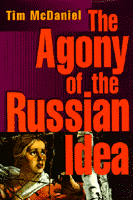
![]()

In the opening chapter McDaniel presents an engaging account of the 'Russian idea'. He argues that the latter is not dissimilar from other cultural trends in the non-Western world in its fundamental opposition to Western European civilization. At the same time he identifies elements of the 'Russian idea' which he considers to remain peculiar to Russia: the adherence to ultimate values and goals; an attachment to a higher form of 'community' as a result of the extreme isolation of the Russian peasantry; equality and the notion of a 'people' (narod) unsullied by social difference; and a belief in the 'good state' which rules in accord with truth. It is these themes which run through the subsequent chapters which consider, chronologically: the dilemmas of Tsarist modernization; the industrialization drive of the 1930s; the struggle for an alternative modernity in the post-Stalinist period; and post-Soviet reform.
The Agony of the Russian Idea is a fascinating contribution to a growing collection of reassessments of Soviet polity and society in the light of the failure of Soviet society to maintain a stable, alternative modernity to that of Western industrialism. The state collapsed in both 1917 and 1991, in McDaniel's interpretation, when the path to modernity it promoted no longer appeared as a pursuit of the 'truth'. It was the utilitarian nature of Tsarist modernization (a programme designed to catch up with the West and maintain Russia's great power status) which ensured its failure since its version of modernity was separate from, and antagonistic to, the perceived 'truth' and integrity of the Russian way of life. In contrast Soviet communism managed to fuse communism, the Russian idea and modernization and thereby created a moral basis for modernization and connected the latter to the 'Russian idea' (p. 101). The Soviet system collapsed, Mc Daniel argues, not because of strategic reform mistakes on the part of Gorbachev but as a result of his rejection of the claim to rule on the basis of 'truth'. The author's wrath is reserved for Yeltsin's reforms, however, which he perceives as having maximized rathe than minimized fear and suffering among the majority of the Russian population. Describing Yeltsin's rule as 'a surgical dictatorship' whose novelty in Russian history lies in the total abandonment of any concern for the protection of the people, he accuses the current Russian President of having succeeded in creating only 'a parody of capitalist democracy' (p. 172).
McDaniel presents an impassioned and empathetic argument which benefits greatly from his obvious openness to the possibilities of Russian development as well as its failures; an important counterbalance to triumphalist interpretations of the 'collapse of communism'. The book also provides a significant contribution to the sociology of Russia past and present, a sadly neglected area of study. Particularly refreshing is the author's ability to analyse the interaction of cultural representation, political discourse and social change in Russian history. One example of this is McDaniel's definition of the 'Russian idea' as not so much an 'idea' as 'an interweaving of social practices, ideological interpretations of these social practices and transformative activity with respect to those practices based partly on the ideas that they help generate' (p. 31). From the beginning, he suggests, the 'Russian' idea was more ideology than an actually existing unique culture; a fact, however, which does not weaken in any way its role in Russian development.
Hilary Pilkington
Centre for Russian and East European Studies
University of Birmingham